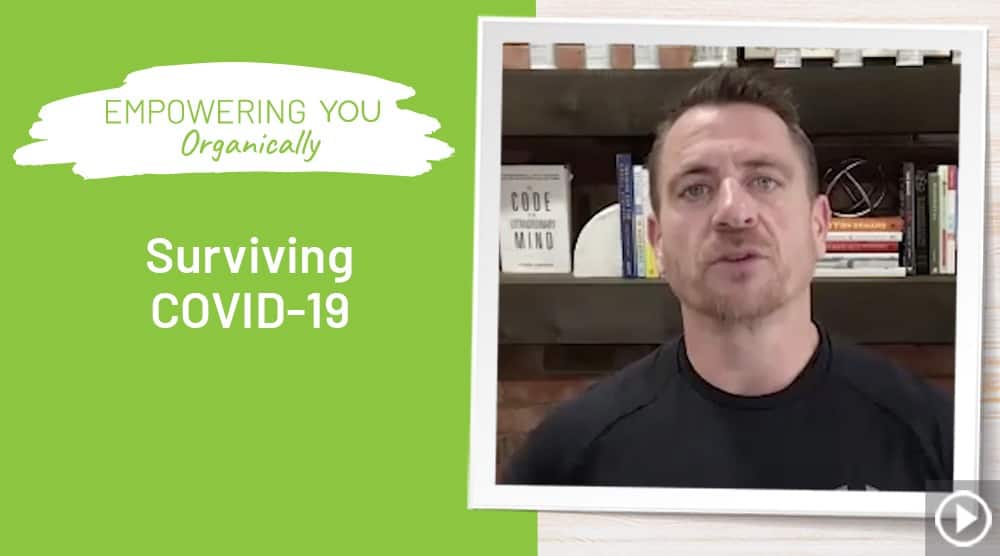Empowering you Organically – Season 10 – Episode 80
Title: Surviving COVID-19
Hosts: Jonathan Hunsaker, TeriAnn Trevenen
Description: Jonathan and TeriAnn get vulnerable today and share their experiences with COVID-19 and self-quarantining. Plus, they remind us to trust the source of our information, to reach out and ask for help, ways to give service to others, and how to build your immunity. Then we break down all the anxiety surrounding the pandemic. TeriAnn shares her Stages of Anxiety and 5 ways to tame the anxiety. Lastly, Jonathan reminds us that the children are watching as he shares tips on helping them navigate their emotions during the COVID-19 pandemic.
***
FEATURED PRODUCT
Total Body Fuel Containing Vitamins and Enzyme-Activated Materials to Provide Critical Nutrients to Your Body
- Whole food supplement with ZERO synthetic ingredients
- 21 uniquely fermented vitamins and enzyme-activated minerals
- Made with 8 organic superfoods and botanicals
- Patent-pending fermentation process maximizes potency and absorption
- Replaces your current multivitamin, vitamin C, B complex, D3, and any whole food fruit & veggie supplement
- Prebiotics and probiotics support overall gut health
- Non-GMO; No fillers, additives, artificial flavors, preservatives, colors, yeast, soy, sodium, or starch
Statistics
- World-O-Meter: https://www.worldometers.info/coronavirus/
- John Hopkins: https://coronavirus.jhu.edu/map.html
- Google Map: https://www.google.com/covid19-map/
Transcripts of News Conferences
Protecting
Remind everyone in your household of the importance of practicing everyday preventive actions that can help prevent the spread of respiratory illnesses:
-
- Avoid close contact with people who are sick.
- Stay home when you are sick, except to get medical care.
- Cover your coughs and sneezes with a tissue.
- Clean frequently touched surfaces and objects daily (e.g., tables, countertops, light switches, doorknobs, and cabinet handles) using a regular household detergent and water.
- WHO: https://www.who.int/news-room/q-a-detail/q-a-coronaviruses
- CDC – Family Member Contracts
- CDC –When and How to Clean Your Home – https://www.cdc.gov/hygiene/cleaning/cleaning-your-home.html
- CDC – When and How to Clean a Facility – https://www.cdc.gov/hygiene/cleaning/facility.html
- Masks –
Mindset – Mental Health
If you are a patient or family member or friend in need of immediate assistance:
- Disaster Distress Helpline (SAMHSA)
Call 1-800-985-5990 or text TalkWithUs to 66746 - National Suicide Prevention Lifeline (Link)
Call 800-273-8255 or Chat with Lifeline - Crisis Textline (Link)
Text TALK to 741741 - Veterans Crisis Line (VA)
Call 800-273-8255 or text 838255
- CDC – https://www.cdc.gov/coronavirus/2019-ncov/long-term-effects/care-post-covid.html
- WHO – https://www.who.int/docs/default-source/coronaviruse/mental-health-considerations.pdf
- How To Help Someone with Anxiety – https://www.mentalhealthfirstaid.org/2018/12/how-to-help-someone-with-anxiety/
- CDC-Talking To Kids: https://stacks.cdc.gov/view/cdc/85899
Not all children and teens respond to stress in the same way. Some common changes to watch for include
- Excessive crying or irritation in younger children
- Returning to behaviors they have outgrown (for example, toileting accidents or bedwetting)
- Excessive worry or sadness
- Unhealthy eating or sleeping habits
- Irritability and “acting out” behaviors in teens
- Poor school performance or avoiding school
- Difficulty with attention and concentration
- Avoidance of activities enjoyed in the past
- Unexplained headaches or body pain
- Use of alcohol, tobacco, or other drugs
There are many things you can do to support your child
- Take time to talk with your child or teen about the COVID-19 outbreak. Answer questions and share facts about COVID-19 in a way that your child or teen can understand.
- Reassure your child or teen that they are safe. Let them know it is ok if they feel upset. Share with them how you deal with your own stress so that they can learn how to cope from you.
- Limit your family’s exposure to news coverage of the event, including social media. Children may misinterpret what they hear and can be frightened about something they do not understand.
- Try to keep up with regular routines. If schools are closed, create a schedule for learning activities and relaxing or fun activities.
- Be a role model. Take breaks, get plenty of sleep, exercise, and eat well. Connect with your friends and family members.
5 Ways to Reduce Coronavirus Anxiety – from UC Health
https://www.uchealth.org/today/coronavirus-anxiety-tips-for-reducing-worries/
Coronavirus anxiety has spurred people to hoard everything from toilet paper to canned tuna. One family in Australia accidentally ordered 48 boxes of toilet paper instead of 48 rolls and ended up with a 12-year supply.
Hand sanitizer has been sold out for weeks, spurring nervous neighbors to share tips on Nextdoor about how to make their own sanitizer, only to discover on fruitless trips to the pharmacy that the key ingredient – alcohol – is also sold out.
Add worries about the tanking stock market to spookily empty store shelves and we are witnessing a full-blown case of coronavirus anxiety.
What is causing coronavirus anxiety?
Psychologist Justin Ross said the coronavirus outbreak is causing a great deal of anxiety because there’s so much uncertainty.
Psychologist Justin Ross said it’s no surprise that mass anxiety and panicky behavior are spreading. Ross, who has a doctorate in psychology and practices at the UCHealth Integrative Medicine Center in Stapleton, said anxiety is a natural response now because the coronavirus outbreak is feeding the three key ingredients that cause anxiety:
- Unpredictability: when we don’t have a clear sense of what may happen next.
- Lack of control: when we believe we do not have direct control for managing issues appropriately.
- Threats to people or things we value.
Ross said anxiety can be a healthy response during times of stress.
“In many ways anxiety serves an adaptive, healthy response when something we value dearly is threatened or perceived to be threatened,” Ross said. “The problem is when the anxiety response runs amok and spins out of control. That’s when it can cause a lot of problems for people.”
Ross said it’s clear that anxiety about the coronavirus outbreak is causing problems for some.
“The current level of uncertainty and a felt sense of lacking control with this virus has led to us buy things unnecessarily or excessively checking the news and social media. We want to feel like we have the ability to control our lives. We want information and we want products that align with our vision for safety and control,” he said.
How to tame coronavirus anxiety?
While it’s not very helpful during legitimate times of stress to give people pat responses like: “calm down,” “don’t panic,” or “don’t worry,” Ross said there are simple steps that can help tame coronavirus anxiety.
Here are his recommendations:
1. Limit your exposure to news and social media.
Schedule times to view updates. Plan to check your news sources or social media feeds just twice a day. Make those checks brief. Then otherwise, avoid updates that could be feeding your coronavirus anxiety.
Unless you are running a hospital or a news outlet, you don’t need to be getting constant updates about the coronavirus outbreak.
“Anxiety can build from media exposure,” Ross said. “Limit your consumption. Pick one or two trusted sources that you are going to rely on and screen out all the others. Schedule two times a day that you are going to check the news and consume media for no more than five minutes each time. That’s long enough to scan the latest information. But, any longer than that is going to spiral your anxiety.”
Ross strongly recommends limiting exposure to social media since a friend’s post —which may not even be accurate — can trigger worries for you. Anxiety essentially can be contagious. Reduce the contagion by skipping the updates.
2. Focus on controlling what you can control.
“We feel anxiety when we are trying to control the things that are inherently outside our control,” Ross said.
Of course, the average person cannot control how widely the coronavirus outbreak will spread. We can’t control if our child’s school will close or if an important work conference will get canceled or if our 401K retirement savings shrinks dramatically.
So, Ross advises people to instead focus on the simple powers we do have.
“We can wash our hands. We can take precautions,” he said. “We can give ourselves the best chance of staying healthy.
Thorough hand washing is the No. 1 way people can stay healthy and avoid spreading the coronavirus. And, we can take reasonable precautions, like staying home from school or work when we are sick, not dipping our hands in community candy or food bowls, and skipping big group functions now if we have underlying health issues or our immune systems are compromised.
3. Get plenty of rest.
Multiple studies have shown that a good night’s sleep can boost your immune system and prevent you from getting sick. Quality of sleep for enough hours a night also helps with mood and can reduce anxiety. If you are not sleeping well, seek help from your primary care provider or a sleep expert. There are some common and treatable causes for poor sleep, like sleep apnea. Ask your primary care provider or a sleep specialist for help.
4. Breathe.
Engage in very simple, 5-minute deep breathing sessions at least three times a day.
“Breathing helps us manage the anxiety response on a physical, physiological and mental level,” Ross said.
The physical level is how the body reacts physically. The physiological response centers on the nervous system. And of course, our mental responses relate to how our brain is responding to stress.
Breathing deeply has the remarkable power to affect people on all three levels.
“One minute of deep breathing helps slow down the sympathetic nervous system — the fight or flight response associated with anxiety. Breathing also helps turn on the parasympathetic nervous system, which helps us restore balance and can provide a sense of calm and focus” Ross said.
The parasympathetic nervous system slows the heart rate and increases intestinal and glandular activities. It’s sometimes called the “rest and digest” system.
Exercise and spending time outdoors can be great ways to reduce stress. For Justin Ross, running is a great escape from stress and anxiety. He loves running marathons.
Ross encourages those already dealing with anxiety and everyone who wants to avoid it, to schedule three sessions a day of slow, deep, deliberate breathing for about three to five minutes during each session.
You don’t need any special equipment, but if an app helps, he recommends the free version of an app called Insight Timer.
Unless you are using your phone to help you breathe deeply, be sure to set it aside during your relaxation sessions.
5. Enjoy the outdoors and get exercise.
Coloradans are lucky that we live in a sunny climate where getting outdoors is easy and quickly can lead us to beautiful places. Take time to go for a walk or a run. Or find a view of some trees or mountains and enjoy a session of deep breathing outdoors.
Ross loves to run. He does marathons and, no matter how busy he is with work and family, he carves out time to run.
“People say, ‘I don’t have time,’” Ross said. “But if you make it a priority, it will happen. Making time to exercise and meditate and putting it in your schedule is going to make a difference.”
Ross often runs with friends and says that both the physical activity and the social connections are really helpful.
Find activities that soothe your soul and put coronavirus and other stressors out of your mind, at least temporarily.
“Exercise and yoga are great. Get out in the fresh air and the sunlight,” Ross said. “As much as possible, go about your normal life.”
***
Subscribe to Empowering You Organically Never miss an episode!
APPLE PODCASTS SPOTIFY GOOGLE PODCASTS





